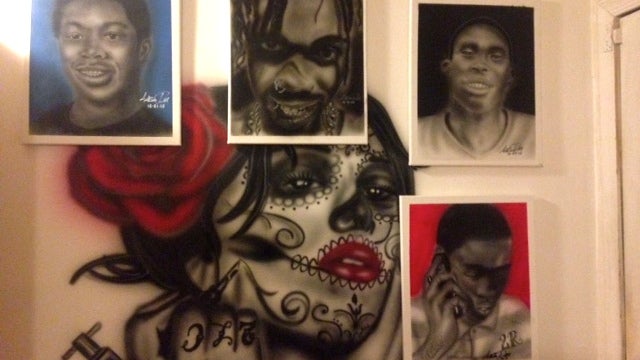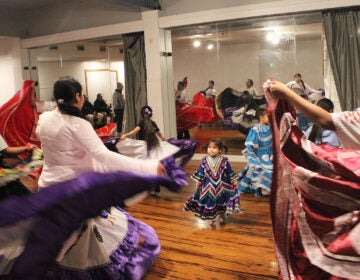Tattoo artist gives grieving families portraits of loved ones killed in Wilmington violence
Listen
Tattoo artist Aaron 'Black Picasso' Ray paints portraits of some Wilmington homicide victims, giving them to families hoping to help them heal. (Anne Hoffman/for NewsWorks)
Losing a loved one to violent crime can be nearly unendurable. Such sudden, shocking deaths leave psychic wounds that may never heal.
But a Wilmington, Delaware, artists is trying to ease the grief for some of the families of those who have been killed in the city. Unfortunately, his stock of potential subjects continues to grow. Just last year, 26 people were killed in Wilmington.
Aaron “Black Picasso” Ray specializes in tattoos, but he has started painting portraits of some of the homicide victims, giving them to families hoping to help them heal.
At his tattoo shop on Wilmington’s West Side, Picasso said families would come in with a photo of their loved one and commission a “Rest in Peace” shirt.
“After a while, it felt almost like an undertaker, like it’s a mortuary, from doing all the ‘Rest in Peace’ shirts,” he said.
The mournful trade in memorial shirts prompted Ray’s decision to paint portraits for the families. He doesn’t charge them anything, just asks that they text him some photos, then picks the most compelling one. So far, he’s completed 10 portraits.
At his shop, Ray displayed a picture of Thomas Cottingham, who went by the nickname “Cannibal.” He died while trying to save a woman and her baby during an armed attack in September.
“That right there captured him,” Ray said, gesturing toward the portrait. “Got his jewelry. All his piercings.”
But beyond the physical details, Ray captured something of Cannibal’s spirit. His face is luminous, and he looks like he’s in on a well-planned practical joke.
“The expression on his face is out of this world. It freaks out a lot of people that come in … a lot of people that knew him,” Ray said. “So they look at him, they look at the picture, and they say, ‘It’s just like looking at him like he’s alive right now.'”
Ray said he does this work because he believes it will help the families heal. He presented the portraits to family members last month at a special event at Studio 2L — his tattoo shop.
“When they actually see the painting,” he recalled, “they’re just like, flabbergasted.”
At Marketta Mangrum’s house in Wilmington, one of Picasso’s portraits hangs prominently above the TV. It shows her 19-year-old son, Raekwon, posing in the mirror while taking a selfie.
Raekwon was killed in April, and Mangrum says the gift of the portrait is deeply touching.
“Well it marked week 37 that my baby was gone,” she said as her eyes filled with tears. “So it just, I don’t know, somebody else thought about him, not just me.”
Ray remembered that when Mangrum came to his event and received the portrait, he witnessed a return to her old self. Her face, he said, had “a genuine glow.”
The portraits are so important because they acknowledge the memories of the people left behind, according to Lee Anderson, a psychologist and one of the founders of the Delaware Grief Awareness Consortium.
“Something as simple as being remembered is huge when you are in grief — especially with sudden, violent death.”
Anderson said she believes the paintings humanize Wilmington’s crime problem.
“It also makes the number, the statistics a real face, a real image, a real person rather than the next numbered homicide,” she said.
For Mangrum, Ray’s gift made her feel less alone.
“This painting says a lot. And it means a lot. I smiled after a long year, I smiled again,” she said. “And I didn’t think I could smile anymore.”
WHYY is your source for fact-based, in-depth journalism and information. As a nonprofit organization, we rely on financial support from readers like you. Please give today.




